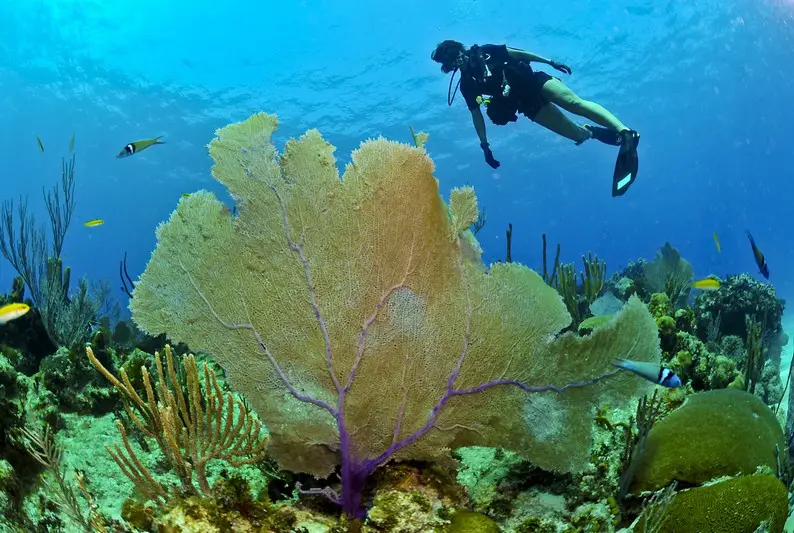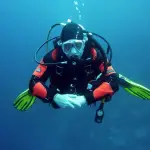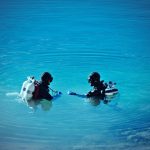
Scuba diving can be challenging, especially for those who are new to the sport. It requires a certain level of physical fitness and mental preparation, as well as the ability to learn and follow important safety procedures.
Before you can scuba dive, you need to complete a certification course, which typically involves both classroom and in-water training. During this training, you will learn how to use scuba diving equipment, how to breathe underwater, how to communicate with your dive buddy, and how to navigate underwater. You will also learn about important safety procedures, such as how to deal with equipment malfunctions and how to manage emergency situations.
Once you have completed your certification, you will need to continue practicing and honing your skills in order to become a proficient and safe scuba diver. This may involve regular dives with experienced partners or taking additional courses to learn new skills and techniques.
While scuba diving can be challenging, it is also incredibly rewarding. It allows you to explore a whole new world underwater and experience the beauty and wonder of marine life up close. With proper training, preparation, and practice, scuba diving can be a safe and enjoyable activity for people of all ages and abilities.
Do you need to be strong to scuba dive?
Scuba diving does require a certain level of physical fitness, but it doesn’t necessarily require exceptional strength or endurance. You should be in good overall health and reasonably fit to be able to handle the physical demands of scuba diving.
Swimming is a critical component of scuba diving, and you need to be able to swim comfortably and confidently in open water. However, you don’t need to be an Olympic swimmer to scuba dive. Basic swimming skills, such as treading water and swimming with fins, are usually sufficient for scuba diving.
Scuba diving also requires some physical exertion, such as carrying and setting up equipment, swimming against currents, and managing your buoyancy underwater. However, most of the equipment used in scuba diving is designed to be lightweight and easy to carry, and you can adjust your buoyancy to make diving more comfortable.
Overall, while scuba diving does require some physical fitness, you don’t need to be exceptionally strong or athletic to enjoy the sport. As with any physical activity, it’s important to check with your doctor before starting scuba diving to ensure that you are healthy enough to participate.
How long does it take to be able to scuba dive?
The amount of time it takes to become a certified scuba diver can vary depending on the training program you choose, your schedule, and your pace of learning. However, most scuba diving certification courses require a minimum of three to four days of training, which includes both classroom and in-water training.
During the classroom portion of the course, you will learn about scuba diving theory, such as how to use scuba diving equipment, how to breathe underwater, and how to manage safety and emergency procedures.
The in-water training portion of the course typically includes pool sessions and open-water dives, during which you will practice skills such as buoyancy control, regulator recovery, and underwater communication. You will also learn how to plan and execute safe and enjoyable dives.
After completing the training, you will be required to pass a written exam and demonstrate mastery of the skills you have learned in order to receive your scuba diving certification.
Some scuba diving certification courses offer flexible schedules, allowing you to complete the training at your own pace. Others offer accelerated programs that allow you to complete the training in a shorter period of time.
It’s important to choose a reputable training program and to take the time you need to fully learn and master the skills required for safe scuba diving. With proper training and preparation, scuba diving can be a safe and enjoyable activity for people of all ages and abilities.
What is the hardest part of scuba diving?
Scuba diving can be a challenging activity, and different people may find different aspects of it challenging. Some of the most common challenges or “hard parts” of scuba diving include:
- Buoyancy control: Maintaining proper buoyancy and controlling your movements underwater can be difficult, especially for new divers. It takes practice to learn how to control your breathing and your movements in order to maintain a stable and safe position underwater.
- Equalising: As you descend underwater, the pressure on your ears and sinuses increases. To prevent discomfort or injury, you need to equalise the pressure in your ears by gently blowing air through your nose or swallowing. This can be challenging for some people, especially if they have sinus or ear issues.
- Equipment management: Scuba diving requires the use of specialised equipment, including tanks, regulators, buoyancy control devices, and more. Learning how to use and manage this equipment properly takes time and practice.
- Safety procedures: Scuba diving involves certain risks, and it’s important to know and follow proper safety procedures to minimize those risks. This includes knowing how to manage emergencies such as equipment failures, underwater entanglements, and other potentially dangerous situations.
Overall, while scuba diving can be challenging, many people find it to be an incredibly rewarding and enjoyable activity. With proper training, preparation, and practice, you can overcome the challenges and become a safe and confident scuba diver.
How hard is it to scuba dive for beginners?
Scuba diving can be challenging for beginners, but it’s important to note that with proper training, preparation, and practice, it can be a safe and enjoyable activity for people of all ages and abilities.
For beginners, some of the challenges of scuba diving may include:
- Learning new skills: Scuba diving requires you to learn and master new skills, such as breathing underwater, controlling your buoyancy, and managing your equipment. While these skills are taught during scuba diving certification courses, it can take time and practice to feel comfortable and confident with them.
- Adapting to a new environment: Underwater environments are very different from what we’re used to on land, and it can take some time to adapt to the new sensations, such as the pressure, the temperature, and the weightlessness.
- Dealing with anxiety: Scuba diving can be an anxiety-inducing activity, especially for people who are new to it. Fear of the unknown, concerns about safety, and other factors can all contribute to anxiety. However, proper training, preparation, and communication with your dive partner can help alleviate anxiety and make diving more comfortable.
Overall, scuba diving can be a challenging activity for beginners, but with proper training and practice, it can also be a rewarding and unforgettable experience. It’s important to choose a reputable training program and to take the time you need to learn and master the skills required for safe scuba diving.
Is diving harder than swimming?
Diving and swimming are two different activities that require different skills and techniques. While there may be some similarities between the two, it’s difficult to say which one is inherently harder or easier than the other.
Swimming is a basic life skill that involves propelling yourself through water using your arms and legs. It’s a low-impact, cardiovascular exercise that can be done in various strokes and at different levels of intensity. Swimming does not typically require any specialised equipment beyond a swimsuit, and it can be done in a variety of settings, including pools, lakes, and oceans.
Scuba diving, on the other hand, involves using specialised equipment to breathe underwater and explore the depths of the ocean. It requires more advanced skills, such as managing buoyancy, equalising pressure, and communicating with your dive partner. Scuba diving also carries a higher level of risk, and proper training and safety precautions are necessary to minimise those risks.
In terms of physical exertion, swimming can be a more strenuous activity than scuba diving, especially if you’re swimming at high speeds or for long distances. However, scuba diving requires more mental focus and attention to detail, as well as the ability to handle the equipment and navigate underwater environments.
Ultimately, whether diving or swimming is harder will depend on your individual strengths, experience, and preferences. Both activities can be enjoyable and beneficial for your health, and it’s possible to become skilled at both with practice and training.
You now may also like to read Can a normal person do scuba diving too.
I hope you enjoyed this article about how hard is it to scuba dive?
I’d love to hear from you. Tell us about your adventures of diving and snorkelling. Please use the comments section below. Please also share your photos. Either from your underwater cameras or videos from your waterproof go-pro’s!
If this article hasn’t answered all of your questions. If you have more questions either about snorkelling or scuba diving (or specifically about How hard is it to scuba dive), please comment below with your questions.
There will also be many more articles about scuba and scuba diving safety tips (and on snorkelling too) for you to read and learn about this fabulous sport.
Have fun and be safe!



